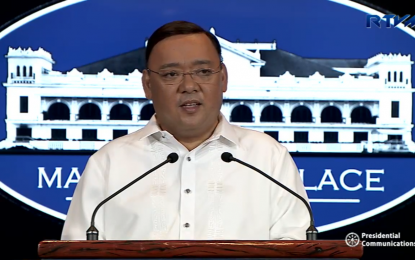
Presidential Spokesperson Harry Roque. (File photo)
MANILA – The cyber libel conviction of Rappler chief executive officer Maria Ressa is a case of “bad journalism” and “ bad lawyering”, Malacañang said on Wednesday.
“There is no suppression of the freedom of the press. It was a case of bad journalism. It was a case of bad lawyering,” Presidential Spokesperson Harry Roque said in an interview with ABS-CBN News Channel.
In a ruling on Monday, Manila Regional Trial Court Branch 46 Judge Rainelda Estacio-Montesa convicted Ressa and former Rappler researcher-writer Reynaldo Santos Jr. of cyber libel and sentenced them to a jail term ranging from six months and one day to six years.
Critics have claimed that Ressa’s conviction is the latest blow to press freedom in the country.
Roque said the integrity of the court’s decision should not be questioned.
“You need to read the decision because the poor judge (Estacio-Montesa) cannot defend her decision. The decision speaks for itself. That is her defense,” he said. “Maria Ressa did not lift a finger to prove the absence of malice despite the presumption of malice in law.”
The court’s ruling against Ressa was based on the 2017 cyber libel complaint filed by businessman Wilfredo Keng, who was named by Rappler as the owner of a sports utility vehicle (SUV) used by the late chief justice Renato Corona.
Keng claimed that Rappler, in its May 29, 2012 article, accused him of lending his SUV to Corona who was then subjected to impeachment proceedings.
Roque said Ressa and his legal counsel, Theodore Te, had failed to show proof that there was no malice in Rappler’s 2012 report.
“That’s what the decision said. There was no effort at all to establish that there was no malice and you can only prove there was no malice if you made sure your stories were, in fact, facts and not mere accusations,” he said.
Roque added that it was “natural” for the court to convict Ressa because she failed to fact-check the allegations against Keng.
“There was no fact-checking. It’s basic. Before you call a man criminal, make sure he’s criminal. Where is the conviction? Where is even the complaint? They did not even exert any effort. Natural (It’s natural that) the court will convict them," he said.
Malacañang on Tuesday said Ressa could apply for probation to avoid imprisonment.
It also told Ressa that she would lose the privilege of skipping actual jail time, should she choose to appeal. (PNA)
